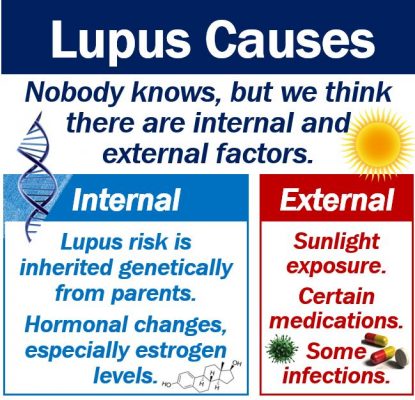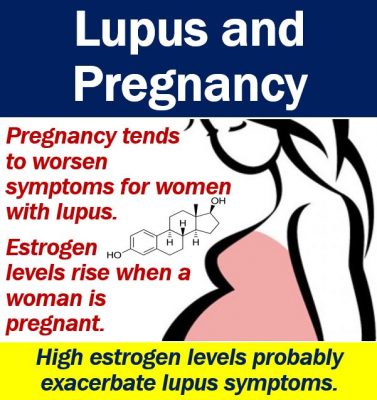Lupus causes – probably a combination of factors
Nobody knows what the lupus causes are. In other words, nobody is completely sure. However, most scientists, but not all of them, believe that it is the result of a combination of factors.
The factors exist both outside and inside the human body. They include genetic, hormonal, and environmental factors. Genetic and hormonal factors are internal ones, while environmental factors are external.
All we can be certain of is that lupus is an autoimmune disease. In other words, it is a disease in which the body’s immune system attacks itself, i.e., healthy cells and tissue.
We also know that it is not contagious, and for pharmaceutical companies it is a huge market. A strong medication, puberty, childbirth, or the menopause can trigger severe symptoms. Sunlight or viral infections are also triggers. However, those are triggers, not causes. Experts don’t know specifically what the lupus causes are.

Lupus causes – three factors
Let’s assume that each of these factors – hormones, genetics, and the environment – causes lupus. Specifically, a combination of them. Below is some information on the alleged factors.
Lupus causes – Hormones
Hormones are regulatory substances that our bodies produce. They travel, for example, in our blood, and stimulate certain tissues or cells into action. In other words, they tell or make cells and tissues do things.
Hormones are messengers that travel inside the human body. They regulate most body functions. Hormones exist in humans, other mammals, birds, reptiles and most other forms of life on Earth.
Estrogen
Experts believe that there is a relationship between the hormone estrogen (UK: oestrogen) and lupus. They believe this because most lupus patients, in fact, ninety percent of them, are female.
Both males and females produce estrogen. However, women produce it in significantly larger quantities than men.
Among women with lupus, symptoms become more severe before menstrual periods. Lupus symptoms are also more severe during pregnancy. Estrogen levels are higher just before menstrual periods and during pregnancy.
This suggests, therefore, that there is a link between lupus symptoms and estrogen levels.

But when women consume estrogen…
However, lupus symptoms do not become more severe if a woman consumes estrogen. Birth control pills and medications for postmenopausal therapy contain estrogen.
In other words, raising a woman’s estrogen levels through medication does not make lupus patients’ symptoms more severe.
Regarding research on what causes lupus, the Lupus Foundation of America writes:
“Researchers are now focusing on differences between men and women, beyond hormone levels, which may account for why women are more prone to lupus and other autoimmune diseases.”

Lupus causes – genes
The term ‘genetic factors‘ refers to what we biologically inherit from our parents. Genes determine what features or traits we inherit from our parents.
Hair color, eye color, and height, for example, are traits that our genes control. Parents’ genes determine whether their child is tall, short, or has black or blonde hair. In other words, ‘genetic factors’ determine the color of our eyes and hair, and how tall we are.
Experts also believe that genetic factors may determine whether we develop lupus. Specifically, genetic factors alongside hormonal and environmental factors.
50+ genes
Geneticists have so far identified over fifty genes which they say are linked to lupus. These genes are more likely to exist in lupus patients than individuals without the disease.
Although they cannot definitively point to these genes as lupus causes, they believe they contribute to it. In other words, humans with these genes have a higher risk of developing the disease.
We know that lupus causes cannot be completely genetically linked. If one identical twin, for example, has lupus, that does not necessarily mean that the other twin also has it. However, the other twin’s risk is higher than average.
Geneticists say that if one identical twin has lupus, the risk for the other twin is 30% higher. If one fraternal twin has lupus, the risk for the other twin rises by 5% to 10%.
Some lupus patients have no family history of the disease. However, in most cases, they have a family history of autoimmune diseases.
Environmental causes
Environmental refers to factors outside the human body. Studies suggest that sunlight exposure, infections, and some medications contribute to the severity of lupus symptoms. Some experts believe that they may also be lupus causes.
Sunlight
A lupus patient whose skin is exposed to sunlight may develop skin lesions. If you already have a rash on your face or arms, going out in the sun can make it worse.
Infections
Infections can cause a relapse in some patients. They can also initiate lupus.
Medications
Drugs can trigger the disease. Antibiotics, anti-seizure drugs, and antihypertensive medications, for example, can trigger lupus symptoms.
Patients nearly always get better as soon as they stop taking their antihypertensive, anti-seizure, or antibiotic medication.
Vitamin D deficiency
Vitamin D deficiency is a marker for damage and disease activity in lupus. Some studies have shown that over two-thirds of lupus patients are vitamin D deficient.
Lupus patients with high vitamin D levels typically have fewer and less severe symptoms than other lupus patients.
We still don’t know definitively which came first; the vitamin D deficiency or lupus.
In other words, we aren’t sure whether vitamin D deficiency raises lupus risk, or whether the disease lowers vitamin D levels. It is probably the latter. If it were the former, then vitamin D deficiency might be one of the lupus causes.
Exposing the skin to sunlight boosts vitamin D levels. Maybe the measures that lupus patients take to avoid sunlight contributes to the decline in vitamin D levels.
Lupus Hub
This article is part of the Lupus Hub, which includes the following articles:
– Lupus treatment options and self-help measures.
Scientists at the University of Houston have received a $2 million grant from the National Institutes of Health to find out what causes lupus. Specifically, they must determine why nine times more women than men develop the disease.

